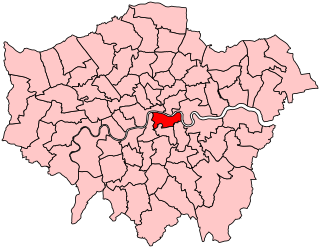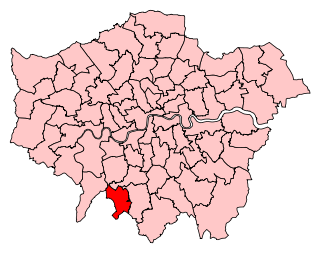This article needs to be updated.(February 2020) |
The Liberal Democrat Party MPs currently have three MPs representing a United Kingdom constituency in London.
This article needs to be updated.(February 2020) |
The Liberal Democrat Party MPs currently have three MPs representing a United Kingdom constituency in London.
| MP | Constituency | Borough parties | Majority | Majority (%) |
|---|---|---|---|---|
| Sarah Olney | Richmond Park | Richmond Liberal Democrats | 7,766 | 11.9% |
| Munira Wilson | Twickenham | Richmond Liberal Democrats | 14,121 | 21.9% |
| Ed Davey | Kingston and Surbiton | Kingston upon Thames Liberal Democrats | 10,489 | 17.2% |

Susan Veronica Kramer, Baroness Kramer PC is a British politician and life peer who served as Member of Parliament (MP) for Richmond Park from 2005 to 2010. A member of the Liberal Democrats, she was their Treasury Spokesperson from 2015 to 2017 and 2017 to 2019.

North Southwark and Bermondsey was a parliamentary constituency which returned one Member of Parliament (MP) to the House of Commons of the Parliament of the United Kingdom. The constituency was created for the 1997 general election.

Islington South and Finsbury is a constituency created in 1974 and represented in the House of Commons of the UK Parliament since 2005 by Emily Thornberry of the Labour Party. Thornberry served as Shadow Foreign Secretary from 2016 until 2020 and is currently Shadow Attorney General for England and Wales.

Southport is a constituency in Merseyside which has been represented in the House of Commons of the UK Parliament since 2017 by Damien Moore of the Conservative Party.

Wimbledon is a constituency represented in the House of Commons of the UK Parliament. Since 2005, the seat has been represented by Stephen Hammond of the Conservatives.

Sutton and Cheam is a constituency in Greater London represented in the House of Commons of the UK Parliament since 2015 by Paul Scully, a Conservative.

The 2005 United Kingdom general election was held on Thursday 5 May 2005, to elect 646 members to the House of Commons. The governing Labour Party, led by Tony Blair, won its third consecutive victory, with Blair becoming the second Labour leader after Harold Wilson to form three majority governments. However, its majority fell to 66 seats compared to the 167-seat majority it had won four years before. This was the first time the Labour Party had won a third consecutive election, and remains the party's most recent general election victory.

The 2010 United Kingdom general election was held on Thursday 6 May 2010, with 45,597,461 registered voters entitled to vote to elect members to the House of Commons. The election took place in 650 constituencies across the United Kingdom under the first-past-the-post system.

The region of Greater London, including the City of London, is divided into 73 parliamentary constituencies which are sub-classified as borough constituencies, affecting the type of electoral officer and level of expenses permitted.
The fifty-fifth Parliament of the United Kingdom was the legislature of the United Kingdom following the 2010 general election of members of parliament (MPs) to the House of Commons. Parliament, which consists of the House of Lords and the elected House of Commons, was convened on 25 May 2010 at the Palace of Westminster by Queen Elizabeth II. It was dissolved on 30 March 2015, being 25 working days ahead of the 2015 general election on 7 May 2015.

The 2021 London Assembly election was held on 6 May 2021 to elect the members of the London Assembly, alongside the 2021 London mayoral election. The mayoral and Assembly elections were originally to be held on 7 May 2020, but on 13 March 2020 it was announced the election would be postponed until 2021 due to the COVID-19 pandemic. It was the sixth election since the assembly was established in 2000. Due to the previous term being extended to 5 years, those elected will serve only a three-year term until the next election in 2024. The election was held on the same day in 2021 as other elections in the UK; the UK local elections, Scottish Parliament election, and Welsh Senedd election.
The region of Yorkshire and the Humber is divided into 54 parliamentary constituencies which is made up of 25 borough constituencies and 29 county constituencies. Since the general election of December 2019, 24 are represented by Conservative MPs and 30 by Labour MPs.
The region of the East of England is divided into 58 parliamentary constituencies which is made up of 16 borough constituencies and 42 county constituencies. Since the general election of December 2019, 52 are represented by Conservative MPs, five by Labour MPs, and one by a Liberal Democrat MP.
The region of West Midlands is divided into 59 parliamentary constituencies which is made up of 35 borough constituencies and 24 county constituencies. Since the general election of December 2019, 43 are represented by Conservative MPs, 15 by Labour MPs, and 1 by a Liberal Democrat MP.
The region of North West England is divided into 75 parliamentary constituencies, of which 39 are borough constituencies and 36 are county constituencies. Since the general election of December 2019, 31 are represented by Conservative MPs, 42 by Labour MPs, 1 by a Liberal Democrat MP, and 1 by the Speaker.
The region of South East England is divided into 84 parliamentary constituencies, which are made up of 23 borough constituencies and 61 county constituencies. Since the general election of December 2019, 73 are represented by Conservative MPs, 8 by Labour MPs, 2 by Liberal Democrat MPs, and 1 by a Green MP.